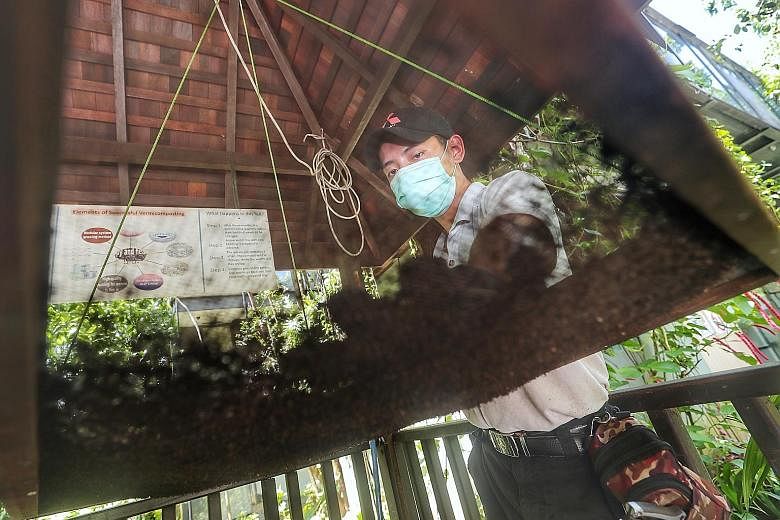Siloso Beach Resort's largest group of workers never get out of bed, but are possibly the busiest and most productive.
They never leave their high-rise quarters - black plastic trays, a hundred of them, neatly stacked on racks inside an unassuming little hut that is nestled within the lush, green surrounds of the eco-hotel.
Dig deeper into these trays and one will find thousands of slimy, wriggling Malaysian blue worms hard at work, eating their way through fruit and vegetable waste - some 600kg a month - from the resort's restaurants.
The worms break down the food waste into vermicast - organic matter rich in nutrients and good bacteria.
With food waste being one of the largest waste streams in Singapore, especially for the hospitality and food and beverage industries, initiatives such as this wormery might help close the waste loop and help the country achieve its goal of being a zero-waste nation.
This act of breaking down, or decomposing, food waste by earthworms is known as vermicomposting, and the resulting vermicast - otherwise simply known as worm poop - makes excellent fertiliser.
Earthworms are also able to convert food waste faster than typical composting bins.
RIGHT AT HOME
Getting the living conditions right for the worms took much trial and error by Siloso Beach Resort, which set up the wormery in 2012.
The worms need to be kept cool, at around 26 deg C to 28 deg C, which is achieved without air-conditioning by lining the hut's metal roof with soil and plants. The hut is enclosed with netting to keep insects and other organisms out.
About 3,000 to 4,000 worms live in a tray, in bedding made up mainly of peat moss - which is partially decayed vegetation or organic matter - and imported from Eastern Europe.
A diluted solution of blackstrap molasses - a dark, viscous and sweet liquid - is added to moisten the peat moss. This also helps to feed the good bacteria, which break down the food waste and facilitate the worms' digestion.
The bedding is refreshed every three to four months.
A semi-permeable tray lining ensures that moisture does not build up at the bottom of the tray, which would cause bad bacteria to grow.
A modular system is used to prevent the farm's entire worm population from being wiped out should a problem arise.
Like most Singapore residents now, the worms adhere to "safe distancing measures": There is no intermingling of worms between any of the 100 trays. Should a problem arise in one tray, it can be easily isolated and quickly ring-fenced.
A controlled amount of food waste is spread out over the top of the bedding every two days, as too much of it would kill the worms.
Besides plant-based kitchen scraps and leftovers, the worms can also compost cardboard and garden waste. The food waste must not be rotting.
The vermicast formed is found mostly at the top of the tray as the worms tend to burrow deeper down to avoid light.
It can be easily harvested by scraping the top layer off.
About 3cm to 5cm deep, the vermicast, which is harvested around once every two weeks, is odourless and has the texture of dried tea leaves.
HOPE FOR THE FUTURE
Food waste in Singapore has increased by about 20 per cent over the last 10 years.
The Republic generated 744,000 tonnes of food waste last year, which is equivalent to each individual discarding two bowls of food a day.
Earthworms, which have been around for centuries, are part of the solution, said Mr Kelvin Ng, Siloso Beach Resort's managing director.
"It is through continuous research that we know how helpful they are to us and our environment.
We hope more will join us in our quest to reduce food waste and improve the biodiversity of our local flora and fauna."
The resort donates some vermicast to schools and community gardens. The worm farm also conducts free tours for students to help raise awareness about vermicomposting, and individuals can learn how to set up their own system at home.
It previously worked with the Institute of Technical Education College East to set up a wormery in the school, and with South West Community Development Council to distribute vermicast to numerous community gardens.


